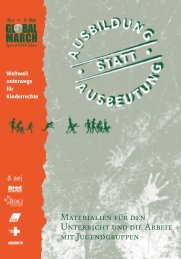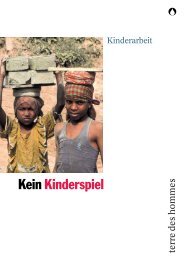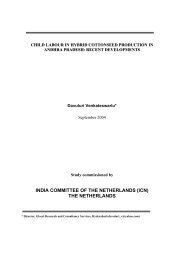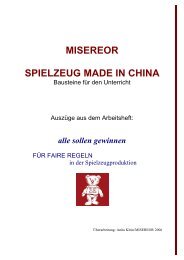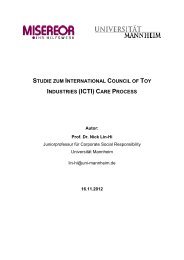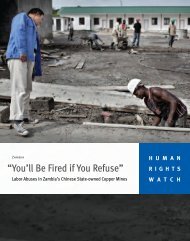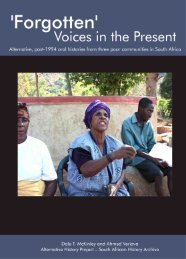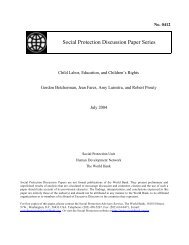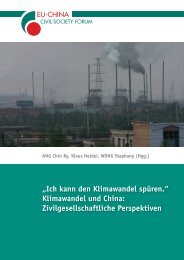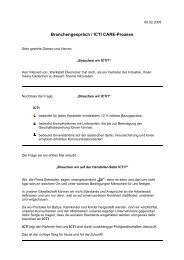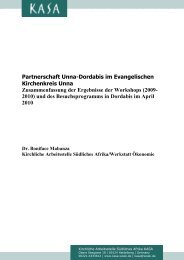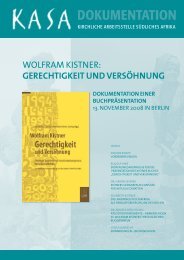Namibia country report
Namibia country report
Namibia country report
- No tags were found...
Create successful ePaper yourself
Turn your PDF publications into a flip-book with our unique Google optimized e-Paper software.
When Alfons settled at Skoonheid in 2000, he established a small shop in a corrugatedironstructure which he added onto his house. Selling his goats from time to time providedsome cash to buy stock for the shop. He sold up to three goats at a time at auctions, to whichhe transported the goats in his donkey-cart. In 2007 he closed the shop as it was no longerproving profitable, mainly because he was no longer permitted to make use of governmenttransport free of charge to get goods from Gobabis to the shop. When the cost of transportbecame unaffordable, he was forced to stop his trading activity. Since 2007 he had also notsold any goats, but there was no reason to do so as his own dryland field and the communalgarden gave him enough food.The MLR prohibits the sale of alcohol on resettlement schemes, and during the field visit therewas no evidence of cuca shops or people being drunk at Skoonheid and Drimiopsis. However,a few people stated that alcohol was in fact being produced and sold on the premises, i.e.some people brewed and sold “bushman tombo” when they needed cash to buy food. Thetombo was made from sugar, cooked maize meal, crushed beans and a particular root.6.3.2.5 InvestmentsVery few people at Skoonheid and Drimiopsis were able to invest in the land, let alone acquiresome livestock, mainly because they never had enough cash. Pensions served only to payschool fees and buy necessities, and the income from any employment found was too lowto provide even for basic necessities, let alone livestock purchases.The story of Bernadine, one of the first people to settle at Drimiopsis in 1989, illustrates thesituation. At an advanced age but still not an official pensioner, her husband was employedfor a while on a farm looking after the livestock of a person who worked in Gobabis. For thishe earned N$200 per month and some mealie-meal, but the cash did not suffice to coverbasic necessities and life was a constant struggle. Then, a medical condition prevented herhusband from working anymore, and Bernadine, also elderly by that time, could no longerwork, so all they could do was grow crops in their own garden for their own consumption.As one of the first settlers at Drimiopsis, Bernadine worked for many years in the communalgarden, but did not draw an income from that work: the money generated from the gardenwas deposited in a bank account and used to buy coffins for beneficiaries who died. Onreaching pensionable age, Bernadine and her husband received a total of about N$900 inpension money every month, but this did not suffice for buying goats. They used a largeportion of the pension money to pay off their previous month’s debts for mealie-meal,tea, meat and soap, and the rest went to supporting their children and their schoolgoinggrandchildren. It was impossible to save any money for other necessities and emergencies,let alone investments. Only one of their children, a son who worked on a farm, sent moneyor food from time to time as his children were at Drimiopsis.The quantitative survey found that most individual households in the group schemes, havingextremely limited material resources including cash, were forced to buy basic foodstuffs atlocal shops on credit, and hence lived in a perpetual cycle of credit and debt.Livelihoods after Section Land Reform: B ● 6. Group <strong>Namibia</strong> Resettlement <strong>country</strong> <strong>report</strong> Schemes (2010) ● 157



